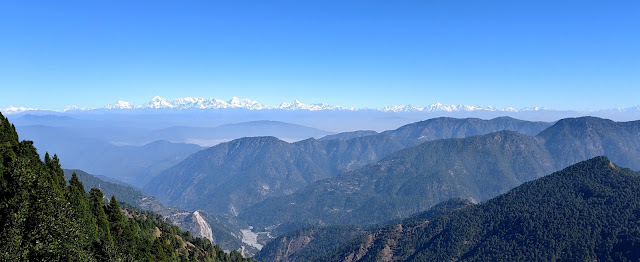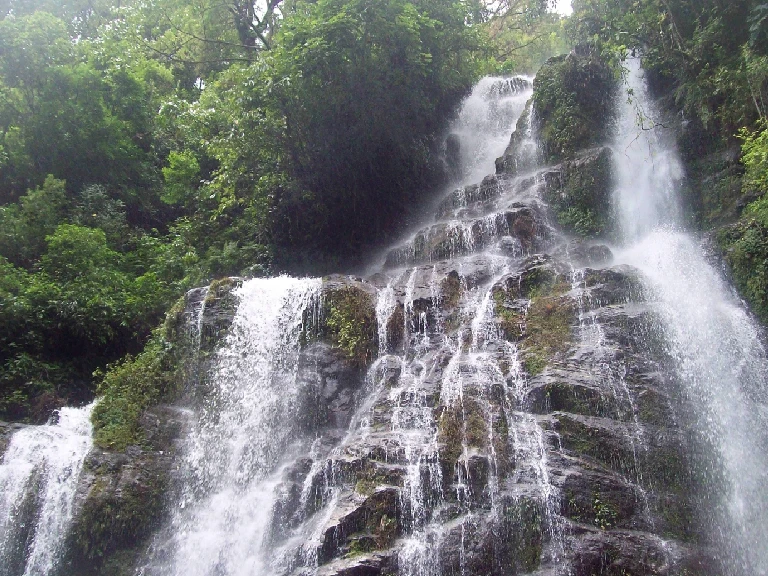Views from the Valleys
Our
hotel attendant pulled back three layers of window curtains increasing the
build-up to seeing what lay beyond. Zzzzzing, rolled the last diaphanous layer hanging
from metal rings on a golden curtain rod. But beyond the large glass windows
lay nothing – clouds of thick, foggy tendrils and mists of emptiness had
blossomed in the cradle of the hills providing no views except whatever you
could imagine.
‘The
weather seems pretty bad today, no views of the valleys,’ responded our
attendant, eking out a sigh from me.
Throughout
our trip from Kullu to Manali, I was mesmerised by the verdant heights of the hills
and the meanders of the snaking Sutlej. I was hoping to cap it all with that unforgettable
view that lights up whenever anyone utters the word ‘Himalaya’ to any sapped
out, sleepy city dweller – deep blue skies and snow-clad white peaks glistening
in the afternoon sun.
Yet,
here was I, staring at brooding clouds, veiling the shiny postcards of my
anticipation.
The
attendant seemed to sense my disappointment and continued, ‘Such is the mood of
the valley. But it will change, such is its nature…’ Years later, I heard the
same sentiment – or wisdom of the mountains, as I like to call it - in a
popular song…Wadi ke mausam bhi ekdin to badlenge…
I
smiled that day and imbibed some of the musings of the valley clouds. Yes, some
may call it caprice, some even gloom, but truth is, it is part of the valley’s
song – those sounds that build the tempo that gives more melody to the lines
once they commence. But at what point of the orchestra you appear is sometimes
a matter of chance. Sometimes, you hear the chorus and resonate immediately, at
others, you wait, hear the revving of the instruments until you understand how
they all come together to create a symphony. Whatever be it, the mountains
teach you patience – as if telling you to wait, take in those deep breathes and
be mindful of the changing seasons, give it time, return if required and respect
the value of the pilgrimage – then one day, the song will start to make sense,
the sound will start to ring in the head and its soulfulness will stir emotions
of ebullience.
Sometimes,
life will keep forcing the tutorial as a teacher until you accept the lesson as
a student. That day continued in gloominess making me restless at first, until
I gave in and accepted that there are things in your control, and then there
are those that are not. For the latter, the joy lies in giving your best to accept
the rains - one can’t fret if the rainbow doesn’t appear. I walked in the swirling
clouds around Old Manali and started enjoying the humid smell of the winds and
the hot cups of tea. And lo, the next morning, the skies cleared up, the clouds
dissolved away in the endless blues of the skies and the peaks came up shiny
white, eternally peaceful as ever.
How
many times thereafter have I not been to these verdant valleys, sometimes in
the Himalaya, sometimes in the Sahyadri, and accepted even before reaching the
destination that you can make an effort to walk up the hills but cannot harbour
expectations from the wilderness of the world. Some things are best left untamed,
unexpected, uncertain and even uncaring - and who better than the endless mountains
to provide this reminder, and make you feel insignificant.
And
yet, when you get to see the twin peaks of Nanda Devi from Vivekananda’s
ashram, or Trishul from Gwaldam, or even the jade green valleys, monsoon-rejuvenated
at Igatpuri, you feel privileged as a pilgrim, not entitled as a traveller. And
with expectations grounded, life only becomes more forgiving and rewarding. It
is then that one starts appreciating even the most basic yet fundamental
aspects of life. The Naini Lake bookended with the colourful houses all around
its one edge then look even more spectacular, every waterfall on the hills around
Munnar takes your breath away and every single view of Kanchenjunga from the
hills of Sikkim and North Bengal looks ambrosial.
Sometimes,
like almost everything else in life, the definition of what you are looking for
also changes. While trekking in the hills of the ghats, we would precisely go
out after the rains, not to adulate at the endless views from medieval
fortresses, but to taste the colours of monsoon, to soak in the wetness of the
nimbus clouds and to gasp at the chilly waterfalls, while being awe-struck at ‘water-rises’
– waterfalls that would rise up in the face of strong convection winds. Even in
the Sahyadri, there would be days of desiccation when despite the rains, the hills
would remain parched and brown, the sun would shine down harshly and the
cataracts would remain infants, yet to swell and swallow. Even here, we would
plant the flags of conquest, take in the windy panoramas and mutter to ourselves,
that the gods can be kinder still…
Whatever
it is you seek, if you don’t find your nirvana in the forgiving valleys, don’t feel
despondent – it is a reminder that sometimes even your dictionary needs to re-accommodate
the definition of beauty; sometimes your definition of best may not be good enough;
that sometimes, life is trying to teach you something, the innate wisdom of
which is far more valuable than the visual treats that you may have taken for
granted.
The
views from the valleys are then not empty - in pure distilled sunlight of the
summer sun, or foggy blooms in the windward clouds, there are swirls and whispers
of wisdom, rich with mizzles of patience, mists of persistence and motes of
perseverance. As if, almost, always reminding us … Wadi ke mausam bhi
ekdin to badlenge…
(Inspired
by photos of Nainital that Prashant sent last week - opening the
floodgates of mountain memories that start with Malli taal and Dorothy’s Seat,
and then travels to the soulful hills all over India – from the dusty emptiness
of the Aravalli to the rain-washed freshness of the Western Ghats to finally
come back to the majesty of the Himalaya)
21st
Novemeber’2021




Comments
Post a Comment